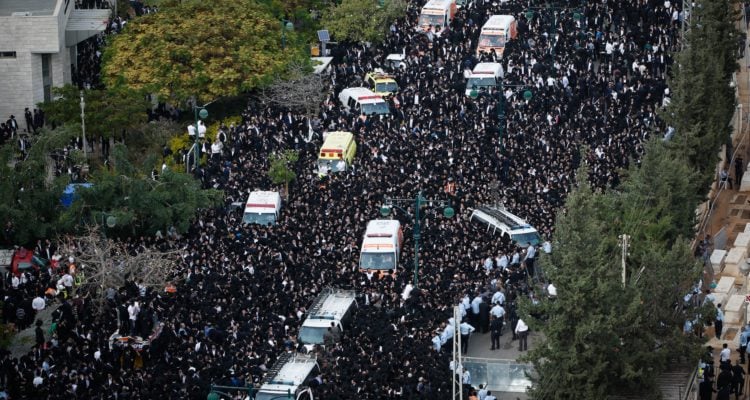A massive gathering attended the funeral Tuesday of Rabbi Aharon Yehudah Leib Shteinman, the head of the Ponevezh Yeshiva in Bnei Brak and the leader of the Degel HaTorah political party’s Council of Torah Sages, who died the same morning at the age of 104.
By: Jack Ben-David, World Israel News
While masses packed into the cemetery in the ultra-Orthodox city of Bnei Brak to pay their final respects to Rabbi Aharon Yehudah Leib Shteinman, the Israeli prime minister Benjamin Netanyahu offered his own moving tribute via video.
“Rabbi Shteinman was a beacon of spirituality and morality,” Prime Minister Netanyahu said in his address. “Everyone who knew him saw the great light that radiated from him: the light of the people of Israel, of the wisdom of Israel, and of the heritage of Israel.”
Rabbi Shteinman, the leader of the non-Hasidic Lithuanian ultra-Orthodox community and known for more moderate rulings, had been battling medical tribulations for months, repeatedly being admitted to hospital over the past year.
“His death leaves me with a deep feeling of loss. May his memory be blessed,” President Reuven Rivlin commented, referring to Shteinman as a “Torah giant.”
Shteinman had requested in his will that no eulogies be read out at his funeral procession itself, and his stated preference that “ten people would be enough at [his] funeral” was significantly exceeded.
In mid-November, Shteinman was rushed to hospital in serious condition and was once again able to recover and be transferred from the ICU unit.
Convalescing in a regular ward, he was once again taken to the ICU ward and again defied the odds as his condition was stabilized. On Tuesday, however, after repeatedly prevailing over his medical woes, Shteinman suffered a fatal heart attack.
Born in 1913 in Brisk in current-day Belarus––then part of the Russian Empire––and educated in the prestigious Imre Moshe and Kletzk yeshiva, Shteinman fled his home during the 1930s in order to avoid conscription into the Polish army and eventually made his way to Switzerland, before being interned at the Schonenberg labor camp, where he spent the duration of the Holocaust.
Following the war, he immigrated to Israel in 1945 and spent the rest of his life in Bnei Brak.
He authored more than two dozen commentaries on the Torah and Talmud and was considered one of the leading halachic (Jewish law) authorities of his generation.
Often guided by pragmatism rather than religious zeal in his rulings, Rabbi Shteinman’s decisions often caused fissures between the Lithuanian and Jerusalem factions, causing members of the latter to throw their support behind Rabbi Shmuel Auerbach, widely considered to be more uncompromising.
TPS contributed to this report





